There’s no better way to experience the world than through travel. Travel provides the opportunity to witness first hand the way people live their lives all over the world through food, music, and culture.
Curating and facilitating this lifestyle for others is the job of a hospitality management professional.
From large hotels and resorts to small bed & breakfasts, and from event planning to facility management, those who work in hospitality management are there every step of the way. Their job is to make sure that your trip of a lifetime is everything it’s meant to be.
To become one of these professionals, however, your own journey usually begins with a degree in hospitality management. What’s more, these degrees lend themselves to a surprising array of careers, beyond those you might expect. In this degree and career guide, we’ll tell you how to make the most of your degree in hospitality management.
So get ready — the world is waiting.
What Is Hospitality Management?

Hospitality management can mean many different things. Most often, hospitality managers oversee facilities like hotels, resorts, and convention centers. There are many moving parts to these kinds of businesses and organizations, including foodservice, reception, and even marketing.
Hospitality managers may even have a hand in planning and coordinating events and activities that draw guests to their destination. Although it’s impossible to anticipate everything a guest might need during their stay, a hospitality manager must keep their team ready and responsive to all possibilities.
Hospitality managers also oversee budgeting and finance as well as general maintenance. They may also be tasked with managing and planning conferences or other kinds of special events.
If a hospitality manager is doing their job well, they’re like the person behind the curtain. Those enjoying their stay, whether it’s for business or pleasure, will never know they’re there.
Kyle Loyd, owner of the travel site Catch the Drift, graduated in 2014 with a hospitality and tourism management degree from Grand Valley State University in Grand Rapids, Michigan.
“I recommend a degree in hospitality management because it opens so many doors to a variety of career opportunities in different industries,” he tells Online Schools Report. Those industries include food and beverage, hotels, tourism, event planning, among others.
“Although each industry is different” he continues, “having the umbrella of a hospitality management degree is not only helpful in finding a job but it allows graduates to test a few areas of the industry to see which is the right fit.”
“Although each job may be different,” he says, “the foundational skills of the degree easily transfer from one job to another.”
Here is a quick list of the possible degrees in hospitality management: professional certificates, associate, bachelor’s, master’s, and even PhDs. Each degree leads to a surprising array of career opportunities. Also useful for those seeking work in this field are certifications such as ServSafe, Alcohol Awareness, and Guest Service Professional.
In the next section, we’ll take a closer look at just some of the many fascinating and rewarding careers made possible by a degree in hospitality management.
Careers in Hospitality Management
Hotel manager is perhaps the first job that comes to mind when one thinks of a career in hospitality management. But that’s just one of many career paths made possible by a degree in this field. In addition to what’s listed below, many hospitality management majors go on to work as foodservice supervisors, tour and travel guides, and transportation managers.
| Job Title | Approx. # Years of Education | Average Annual Salary |
| Foodservice Manager | 2 | $55,320 |
| Meeting, Convention, and Event Planner | 4 | $50,600 |
| Lodging Manager | 2 | $54,430 |
| Chefs and Head Cook | 2 | $51,530 |
| Gaming Services Worker | 2 | $23,520 |
All salary data is courtesy U.S. Bureau of Labor Statistics Occupational Outlook Handbook.
Foodservice Managers

Foodservice offers a whole menu of operational challenges unique from other areas of hospitality management. Nevertheless, many who study hospitality management partner their own foodservice experience to find work as foodservice managers.
This work takes place in hotel and resort restaurants as well as catering for special events. In this business, foodservice managers hire, train, and supervise employees. They also are in charge of every step of the food preparation process: from ordering food and drink ingredients and supplies to minute details like portion size and overall food presentation. No meal is served without first getting the approval of a foodservice manager.
Part of the responsibility of a foodservice manager is also to ensure their facility remains in compliance with all food safety standards and to address any customer issues related to the quality of the food. Foodservice managers may also develop and maintain employee schedules, manage budgets and payroll, and develop and enforce high levels of customer service.
There are technically no minimum educational requirements to become a foodservice manager, and many work their way into these positions through foodservice experience alone.
Postsecondary degrees in hospitality management, however, can increase employment opportunities, income potential, and open up the possibility of moving into upper levels of hospitality management.
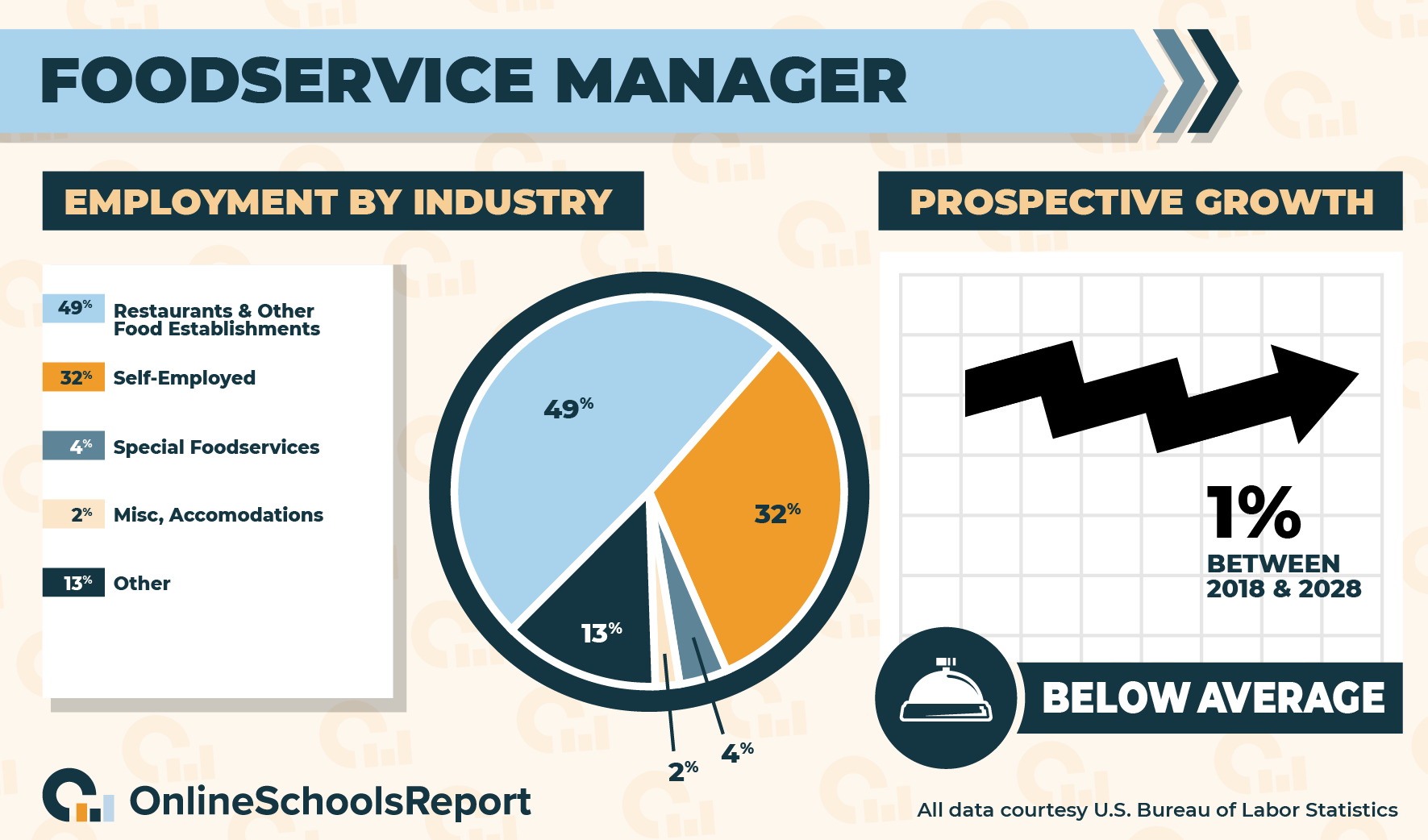
Foodservice managers make a little more than $55,000 a year, according to the Bureau of Labor Statistics. There are roughly 353,000 foodservice management jobs in the U.S., the BLS goes on to state, but that number is only expected to grow at a rate of 1%, which is well below the national average.
This will make it a competitive field going forward, putting candidates with a degree like hospitality management at even more of a premium.
Data from the BLS also states that 49% of foodservice managers work in restaurants and other kinds of food establishments. Following that, 32% are self-employed and 4% work in special food services. The remaining 2% work in other forms of accommodation. Good states for this line of work include California and Florida.
Though rarely required by an employer, foodservice professional certifications are also available, such as the Food Protection Manager Certification (FPMC) from the American National Standards Institute, and the Foodservice Management Professional (FMP) designation from the National Restaurant Association Educational Foundation.
Meeting, Convention, and Event Planners

Not all who travel are on vacation. Business conferences, conventions, and other special events are a big source of revenue for hotels and resorts, attracting people beyond those who are just traveling for pleasure.
Behind events such as these, there’s always a meeting, convention, and event planner. Many skills taught in a hospitality management degree are easily translatable to this line of work.
Not all events under the purview of an event planner will be initiated by the facility. Many such organizations rent space to groups and private parties to host weddings, business conferences, and other kinds of gatherings.
It’s the job of a meeting, convention, and event planner to meet with clients such as these to clearly establish goals and expectations. This can include the whole scope of the event but also smaller details like time, location, and budget.
Some meeting, convention, and event planners also work independently, so the next step in the process can be soliciting bids for available space to host the event, while also coordinating room reservations, transportation, and catering.
Jobs like these don’t end once the event begins. Event planners also oversee every aspect of the event once it has started. This includes making sure the staff performs at high-levels of customer service.
Once it’s over, event planners settle accounts, pay bills, and otherwise tie up any loose ends related to the project.
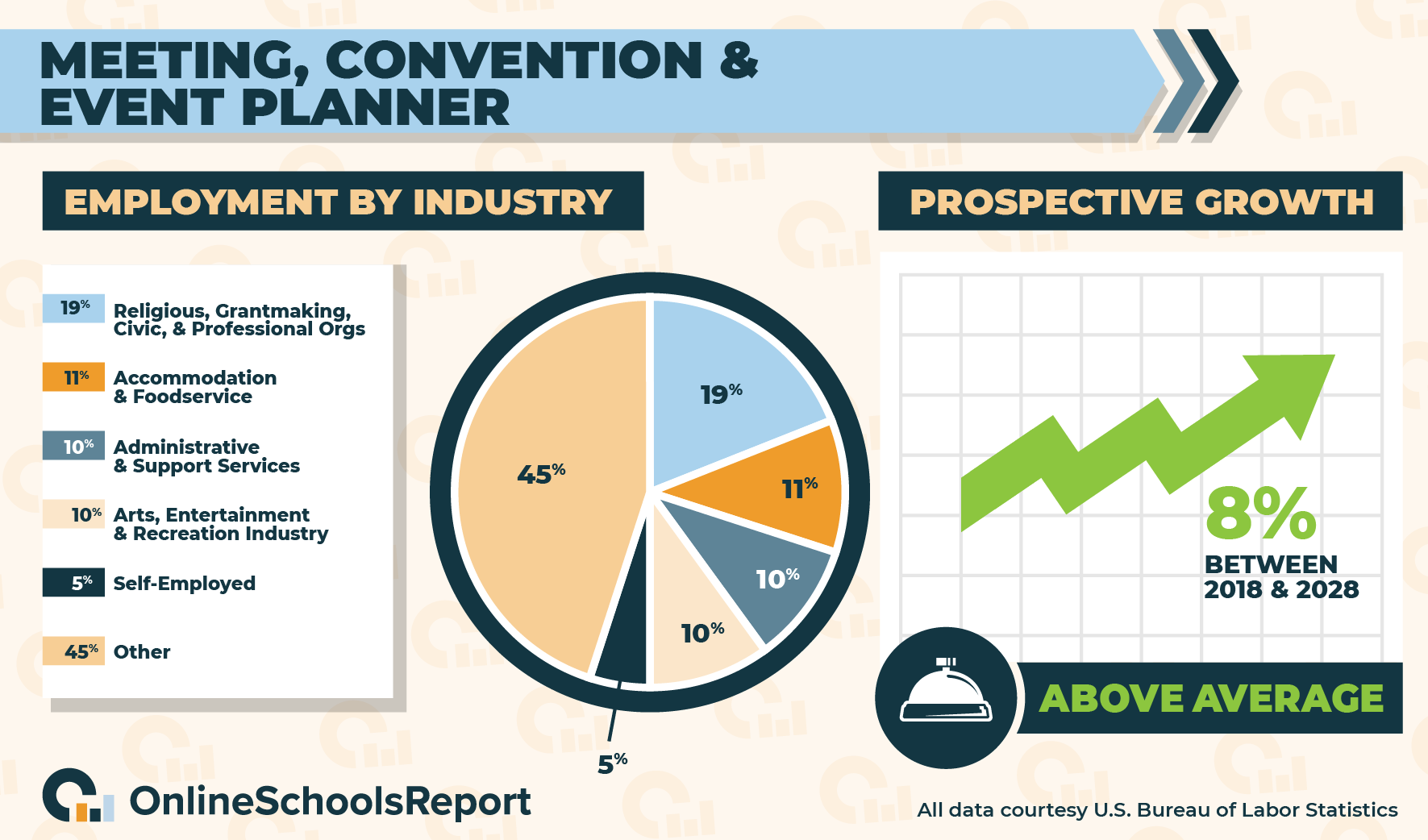
According to the Bureau of Labor Statistics, event planners make roughly $51,000 a year on average, and a bachelor’s degree is the minimum educational requirement for most positions. There are about 139,000 meeting, convention, and event planner jobs in the U.S. That number is expected to grow at a rate of 8% in the decade spanning 2018–2028, which is above average for many other professions.
Also according to the BLS, 19% of event planners work for religious, grantmaking, civic, and professional organizations. Following that, 11% work in accommodation and foodservice and 10% work in administrative and support services. An additional 10% work in the arts, entertainment, and recreation industry, and the final 5% are self-employed workers.
Though additional professional certification is rarely required to work in this field, the Certified Meeting Professional (CMP) credential is offered through the Events Industry Council, and the Certified Government Meeting Professional (CGMP) designation is offered through the Society of Government Meeting Professionals, to name just a couple.
States with strong employment numbers in this profession include California and New York.
Lodging Manager

The job of a lodging manager is to make sure a guest’s stay at a hotel, motel, resort, or even just a bed and breakfast meets or exceeds all expectations. More than anything, the job is about hospitality, so naturally, it’s a great fit for anyone who studied hospitality management in college.
There are a few job titles that fall under the umbrella of lodging manager. That list includes general managers, revenue managers, front-office managers, and convention service managers.
Across these job titles, lodging managers maintain the cleanliness of all guest rooms and public areas, as well as high-levels of guest service. The goal being to make sure guests are happy during their stay and that the hotel is otherwise well run.
A lodging manager also commonly handles questions from guests regarding hotel policies and services. They also supervise staff members, which can include hiring, firing, and scheduling, as well as coordinating and resolving all problems related to front-office activities.
It takes a keen business mind to be a successful lodging manager, as they keep tabs on the financial well-being of the business and staff performance.
Other tasks lodging managers are in charge of include setting room rates, preparing budgets, approving expenditures, and allocating funds to various departments throughout the operation.
Officially, there is no minimum education requirement beyond a high school diploma or equivalent to become a lodging manager, though postsecondary degrees can increase employment opportunities and earning potential.
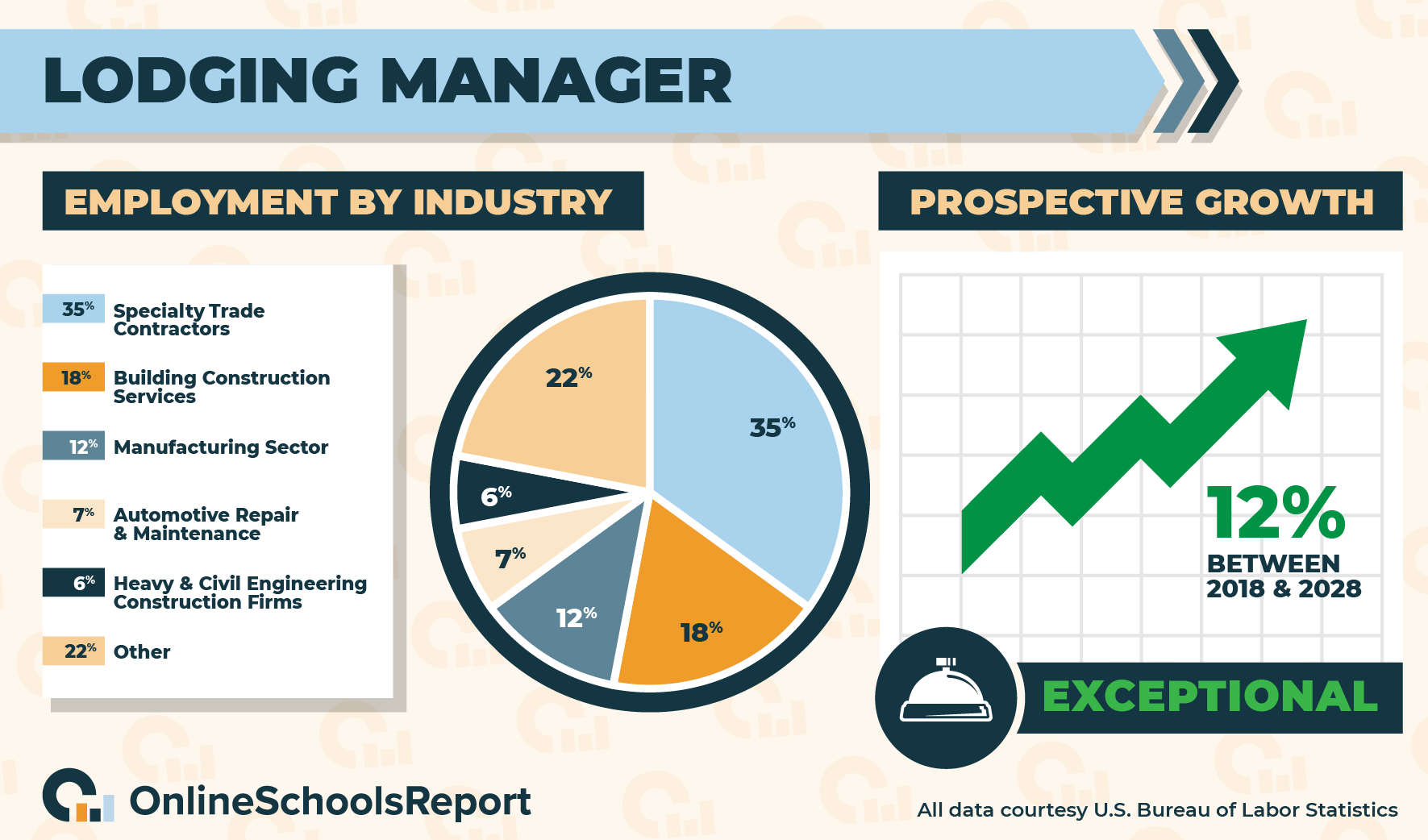
Lodging managers make on average about $54,000 a year according to the Bureau of Labor Statistics, and there are just a little more than 57,000 jobs in the U.S. Unfortunately, that number is expected to decline at a rate of 12% over the decade spanning 2018–2028. This makes it a competitive job market, so in addition to postsecondary degrees, certification can be helpful to secure employment.
Certifications are offered through the AHLEI, or the American Hotel & Lodging Educational Institute’s Hospitality and Tourism Management Program. Certification in Hotel Analytics (CHIA) is another option also offered by the AHLEI.
Data from the BLS states that over half, or 59%, of all lodging managers work in travel accommodation, 31% are self-employed, and 2% work in RV parks and other recreational camps. Good states to find work as a lodging manager include California and Florida.
Chefs and Head Cook

Foodservice is an important part of any hospitality experience. It makes sense then that many combine their hospitality management degree with foodservice experience. This can lead to work as a chef or head cook, either in an independent restaurant, in a catering service, or in a hotel or resort.
Chefs and head cooks oversee every aspect of the foodservice operation, from the freshness of the food to the presentation of the dishes. The quality of the food and the supervision of cooks and other staff involved in foodservice is also often the responsibility of the head cook.
Those working in jobs such as these may also develop recipes and plan menus, and keep equipment, supplies, and work areas clean and functioning. Chefs and head cooks also commonly interview, hire, train, and discipline staff.
Examples of job titles that fall under chef and head cook include executive chefs and chefs de cuisine, sous chefs, and private household chefs.
Though rarely prioritized over work experience, industry certification is offered through the American Culinary Federation, which can take as little as six months to five years to complete, depending on the level of certification.
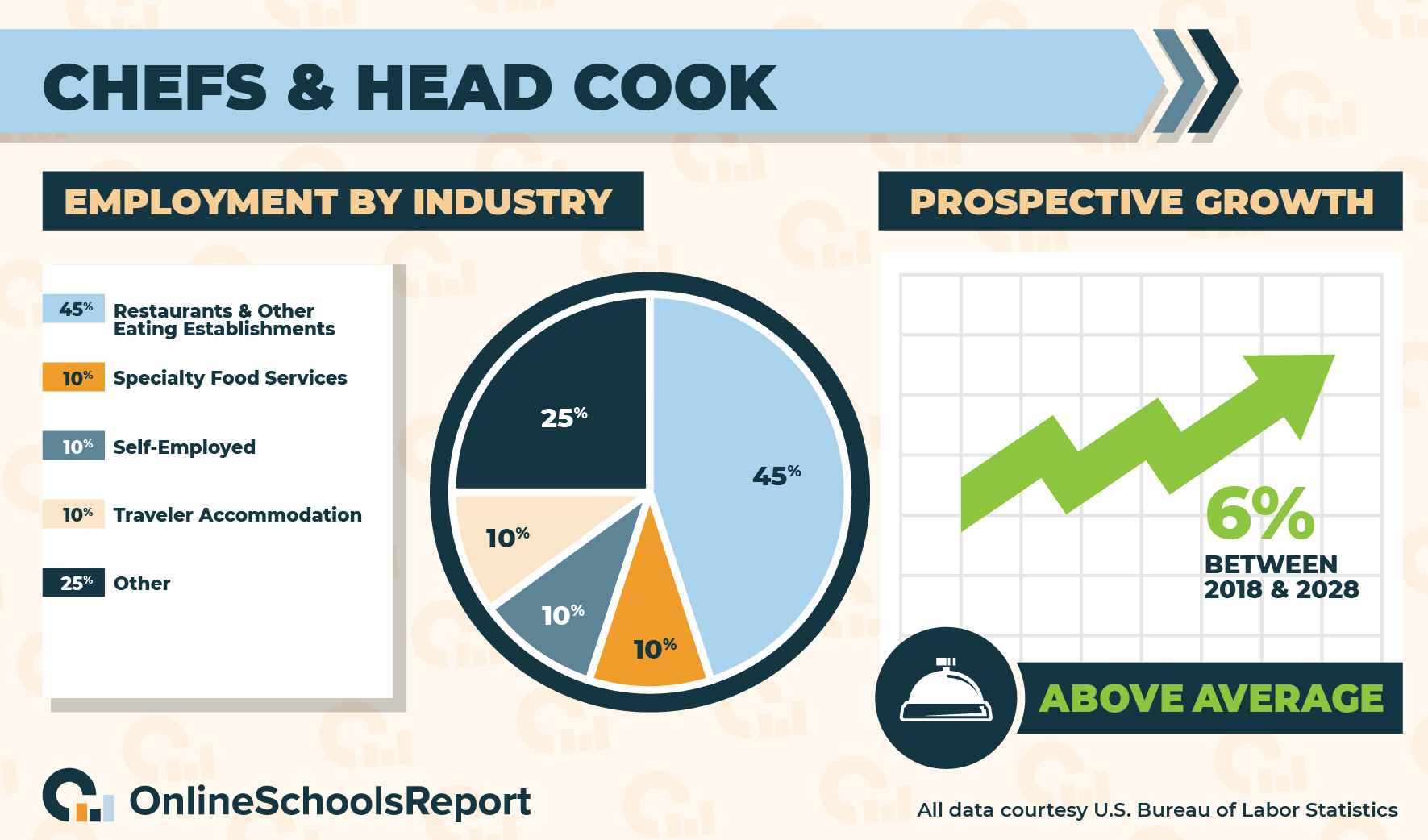
Chefs and head cooks make on average about $52,000 a year, according to the Bureau of Labor Statistics, and there is no real minimum education requirement outside of a high school diploma or equivalent, work experience, and demonstrable talent, though postsecondary degrees in majors like hospitality management help applicants gain a competitive advantage for many.
Also according to the BLS, there are about 149,000 jobs in the U.S., and that number is predicted to increase at a rate of 6% between 2018 and 2028, which is faster than average.
Data from the BLS also reflects that 45% of all chefs and head cooks work in restaurants and other kinds of eating establishments, while 10% work in specialty food services. Following that, an additional 10% are self-employed and 10% work in traveler accommodation.
Finally, 6% work in the amusement, gambling, and recreation industry. States with high levels of employment in this industry include California and New York.
Gaming Services Workers

Few travel destinations are bigger than Las Vegas, and central to the Las Vegas travel industry is gaming and gambling. But gaming industry professionals don’t just work in casinos. They’re also employed at racetracks and wherever else card games or slot machines are offered as guest entertainment.
What’s for certain is that a degree in hospitality management offers many skills relevant to work in the gaming services industry, of which customer service is a primary part of the job.
Additional duties include monitoring gaming operations to ensure that rules and fair play are being observed by all guests. Oftentimes, a gaming services worker must inform a manager or supervisor if cheating or other rule-breaking is observed.
There are many different kinds of gaming services workers. That list includes gaming managers and supervisors, whose work involves high-level gaming management, including customer service and staff management, among other tasks.
There are also slot supervisors, tasked specifically with slot machine oversight specifically, while gaming dealers are in charge of card and dice games. Last on this list are gaming and sportsbook writers and runners, handling and tracking bets and winnings in sports-related gambling.
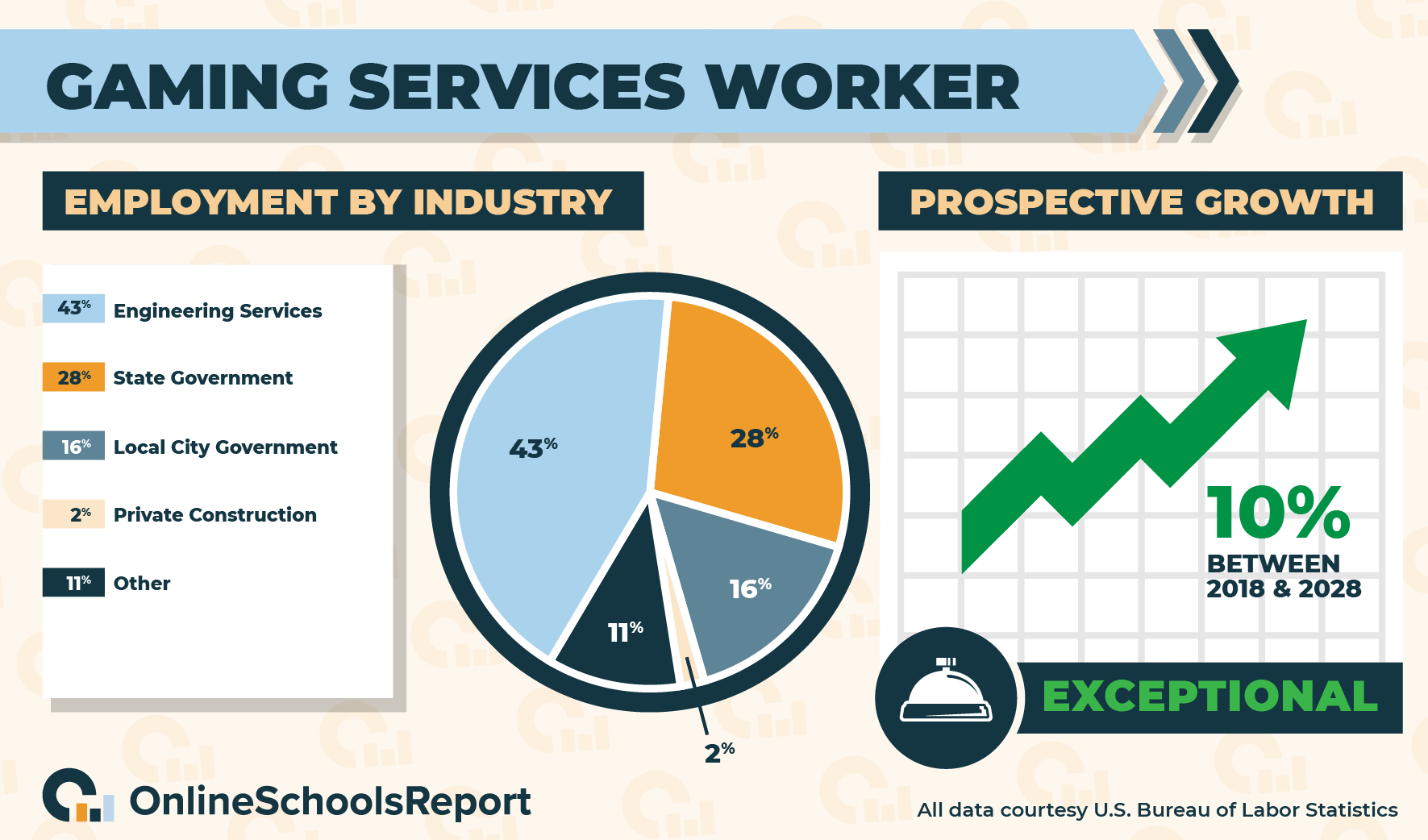
Across all kinds of gaming services, the average annual salary for gaming services workers is about $24,000 annually. There are also about 187,000 gaming services positions in the U.S, according to the Bureau of Labor Statistics. That number is projected to grow at a rate of 10% between 2018 and 2028, which is faster than the average rate of growth in many other professions.
There are no minimum education requirements to become a gaming services worker, outside of a high school diploma or equivalent. Certification is required from a state regulatory agency like a state casino control board or gaming commission.
Postsecondary degrees in a major like hospitality management can increase the likelihood of promotion to a supervisory position or to another higher-paid position within the casino, hotel, or resort.
This certification process varies depending on the position within the gaming services industry, and from state to state. Gaming services workers must also pass a background and drug test.
Most gaming services workers, or 25%, work for the state, since states most often regulate gaming and gambling, according to the BLS. Following that, 17% are self-employed, and 4% work in the spectator sports industry. Good states to live in for gaming services workers include California and Nevada.
Hospitality Degrees
Ready to get your start in the hospitality management industry? It all begins with a degree. Choose yours from any one of the exciting degree options listed below.
Associate Degree in Hospitality Management

Many begin their educational career in hospitality management with an associate degree. This is a good choice for those seeking to enter the workforce as quickly as possible. In this scenario, the best choice is an Associate of Applied Science (AAS) degree in Hospitality Management. These degrees are highly vocational and hands-on, giving students the skills they need to succeed.
The drawback to AAS degrees, however, for those interested in completing their bachelor’s degree, is that credits earned are rarely transferrable to four-year colleges and universities. Students intending to continue their education with a bachelor’s degree or beyond should consider an Associate of Science (AS) degree in Hospitality Management.
Both degree programs will cover topics such as food safety and sanitation, hotel management, among other subjects. AS degree programs in particular will focus on principles of management, travel sales, event planning, and general education. Other common coursework covers technology in hospitality management and ethical hospitality management.
Both degree paths offer some flexibility to customize coursework to specific areas of interest within the hospitality industry, and many associate degree programs are offered both online and through traditional in-person coursework.
Although admission requirements vary between institutions, a high school diploma or equivalent with a GPA of at least 2.0 is a prerequisite for all associate degree programs. Transcripts and SAT or ACT scores may also be required.
Most associate degree programs can be completed in about two years. That’s about 60 college credits. Internships may also be a condition for graduation.
Bachelor’s Degree in Hospitality Management

Some schools house their hospitality management degrees under business administration, offering a Bachelor of Arts in Hospitality Management. Related degree titles include service management, or simply a concentration in hospitality management within a traditional business degree. Bachelor of Science in Hospitality Management degrees (BSHM) are also common.
Regardless of the specific bachelor’s degree, students will leave behind some of the vocational training common in an associate degree programs for more high-level business and management skills and experience.
Programs such as these also provide an in-depth introduction to the food and beverage industry, marketing, public relations, and principles of staff management, as well as general business administration.
Common coursework in bachelor’s degree programs can include public speaking and facility management. Concepts learned will be applicable to a broad range of settings within the hospitality industry, from five-star hotels to conferences and sporting events.
Other areas of concentration include restaurant management, meetings and events, and even PGA golf tournament management.
On top of all that, these programs provide the opportunity to apply this knowledge in internships and fieldwork. Careers made possible by a bachelor’s degree in hospitality management include food and beverage manager, hospitality department trainer, and lodging manager.
Minimum education requirements to work in hospitality vary greatly, but a BS degree will increase opportunities to work in upper-levels of management. A high school diploma or equivalent is a prerequisite with a GPA of 2.0, though many transfer credits earned in an associate degree program. Transcripts and SAT or ACT scores may also be required.
Most bachelor’s degree programs require 120 credits to be completed before graduation, with a GPA of at least 2.0, though this can vary. This takes many students about four years. Hospitality management bachelor’s degrees are offered both online, in a hybrid model, or in the traditional classroom setting.
Online programs are sometimes more affordable, and many are designed to accommodate the schedule of an individual already working in the hospitality industry.
Master’s Degree in Hospitality Management

Students seeking to secure a position in the upper levels of management at a hotel, resort, or similar facility often seek a Master of Science in Hospitality Management. These degrees also allow a graduate to teach hospitality management at the college or university level.
Other relevant master’s level degree options, among others, include a Master of Science in Hotel Management, or simply an MBA, or Master of Business Administration in Hotel Management.
Many who graduate from a master’s degree program go on to work as a hospital training and development manager, a meeting, convention, and event planner, or a hospitality sales manager.
Regardless of the master’s degree program chosen, students will gain an even more in-depth perspective on finance, management, and business communication in the context of hospitality.
Furthermore, a master’s degree program will offer access to career guidance, internships, and networking opportunities.
Specific coursework can involve corporate finance, hospitality business law, and workforce management. A terminal thesis is often a requirement for graduation, which is researched and developed in collaboration with a faculty advisor.
A bachelor’s degree is a prerequisite for a master’s degree program, with a minimum GPA of 3.0, though this minimum can vary between programs. Submitting GMAT or GRE scores may also be required, as well as letters of recommendation or statements of personal intent.
Most master’s degree programs require between 30 and 48 credits to complete. This takes many students two years. Programs are offered online, in-person, and through hybrid models, and most are designed to work around the schedule of a student already working in the industry.
Some accelerated programs exist, fast-tracking a student from their bachelor’s to master’s degree as quickly as possible.
Doctorate Degree in Hospitality Management

To reach the educational peak in hospitality management, one must acquire a PhD in Hospitality Management, Hotel Administration, or Hospitality and Tourism Management. Across all these degree options, what remains the same is that a PhD program will be research-heavy. For students seeking to apply already developed principles to the industry of hospitality management, there are also doctorate degrees in subjects like tourism management.
The primary difference being that PhD programs require the development and defense of a thesis project, while doctorate programs sometimes prioritize practicums and fieldwork over original research, though this is not always the case.
Many who hold a PhD or doctorate in hospitality management go on to teach the subject at a college or university, or to work in the upper levels of management in the international tourism industry and in governmental institutions related to travel and tourism.
Some examples of coursework in a doctorate or PhD program in hospitality management include tourism policies, hospitality law, and revenue management.
That’s while areas of research and emphasis made possible in some programs include hotel and destination branding, quality-of-life, tourism, hospitality research, and strategic management and finance.
In addition to a dissertation, most doctoral-level degrees require between 60 and 90 credits to complete. This can take anywhere from two to three years for many students, though some take longer to complete their program while researching and defending their dissertation. PhD and doctorate students also commonly teach for the institution at which they study.
A master’s degree is usually required in hospitality management or a related subject, with a minimum GPA of 3.0, though this may vary between programs. Transcripts and GMAT or GRE scores may also be required, as well as letters of recommendation or a statement of personal intent.
PhD and doctorate programs are available online, through a hybrid model, or in the traditional classroom setting. Many cater to the scheduling needs of professionals already working in the hospitality industry.





